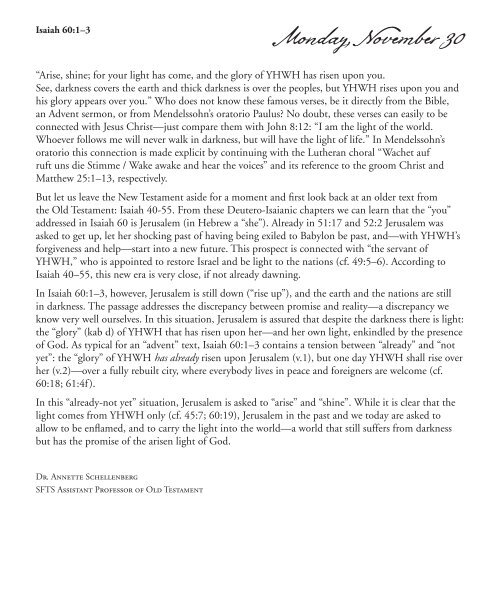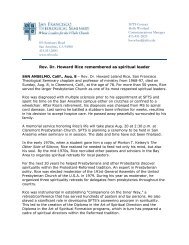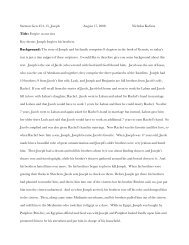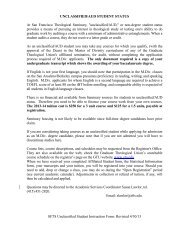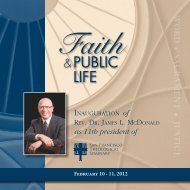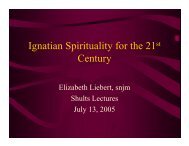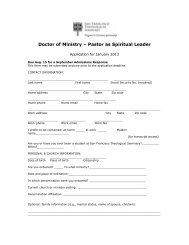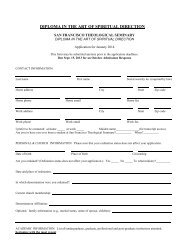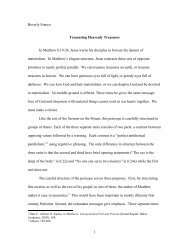Advent Devotional Resource - San Francisco Theological Seminary
Advent Devotional Resource - San Francisco Theological Seminary
Advent Devotional Resource - San Francisco Theological Seminary
You also want an ePaper? Increase the reach of your titles
YUMPU automatically turns print PDFs into web optimized ePapers that Google loves.
Isaiah 60:1–3Monday, November 30“Arise, shine; for your light has come, and the glory of YHWH has risen upon you.See, darkness covers the earth and thick darkness is over the peoples, but YHWH rises upon you andhis glory appears over you.” Who does not know these famous verses, be it directly from the Bible,an <strong>Advent</strong> sermon, or from Mendelssohn’s oratorio Paulus? No doubt, these verses can easily to beconnected with Jesus Christ—just compare them with John 8:12: “I am the light of the world.Whoever follows me will never walk in darkness, but will have the light of life.” In Mendelssohn’soratorio this connection is made explicit by continuing with the Lutheran choral “Wachet aufruft uns die Stimme / Wake awake and hear the voices” and its reference to the groom Christ andMatthew 25:1–13, respectively.But let us leave the New Testament aside for a moment and first look back at an older text fromthe Old Testament: Isaiah 40-55. From these Deutero-Isaianic chapters we can learn that the “you”addressed in Isaiah 60 is Jerusalem (in Hebrew a “she”). Already in 51:17 and 52:2 Jerusalem wasasked to get up, let her shocking past of having being exiled to Babylon be past, and—with YHWH’sforgiveness and help—start into a new future. This prospect is connected with “the servant ofYHWH,” who is appointed to restore Israel and be light to the nations (cf. 49:5–6). According toIsaiah 40–55, this new era is very close, if not already dawning.In Isaiah 60:1–3, however, Jerusalem is still down (“rise up”), and the earth and the nations are stillin darkness. The passage addresses the discrepancy between promise and reality—a discrepancy weknow very well ourselves. In this situation, Jerusalem is assured that despite the darkness there is light:the “glory” (kabōd) of YHWH that has risen upon her—and her own light, enkindled by the presenceof God. As typical for an “advent” text, Isaiah 60:1–3 contains a tension between “already” and “notyet”: the “glory” of YHWH has already risen upon Jerusalem (v.1), but one day YHWH shall rise overher (v.2)—over a fully rebuilt city, where everybody lives in peace and foreigners are welcome (cf.60:18; 61:4f).In this “already-not yet” situation, Jerusalem is asked to “arise” and “shine”. While it is clear that thelight comes from YHWH only (cf. 45:7; 60:19), Jerusalem in the past and we today are asked toallow to be enflamed, and to carry the light into the world—a world that still suffers from darknessbut has the promise of the arisen light of God.Dr. Annette SchellenbergSFTS Assistant Professor of Old Testament


